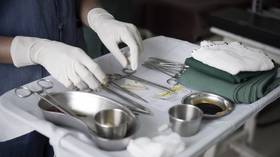Data hog: Surgery performed on pig via 5G some 30 miles away

A surgeon in China has successfully conducted the world’s first remote operation carried out via a 5G network, paving the way for major advances in the field of telemedicine and providing hope for future disaster response.
Using two robotic arms, Liu Rong, director of the Department of Hepatobiliary and Pancreatic Oncology of Beijing 301 Hospital, removed sections of a pig’s liver in an operating theater about 50km (30 miles) away.
Also on rt.com Surgeon fined $3,000 for removing woman’s healthy kidney that he’d believed was a tumorA piece of the pig’s hepatic lobule from its liver was successfully removed in the roughly one-hour-long surgical procedure. The wounds were neat and the bleeding minimal, and the pig’s condition was described as stable, according to Chinesemediareports.
The incredible op is yet another landmark in the nascent field of telemedicine. The January 8 procedure was not the world’s first remote-controlled operation, that honor went to the transatlantic Lindbergh Operation in 2001, but it was the first remote operation carried out over 5G.
5G networks can be between 10 and 100 times as fast as existing networks, with a lag time of just 0.1 seconds – frustrating for hardcore gamers perhaps, but not enough to throw a top class surgeon off their game.
Also on rt.com Man of steel: Chinese factory worker miraculously survives being impaled on spikes (GRAPHIC PHOTOS)Such technology could have incredible applications in war or disaster zones, affording surgeons the ability to perform life-saving operations on the frontlines from relative safety miles away. It would also afford unique training opportunities for specialists to showcase and share their skills with less experienced colleagues.
5G networks constitute a “trend-setting technology which will play an important role in surgery,” Dr Michael Kranzfelder from Rechts der Isar Hospital in Munich told last year’s German Society of Surgery, adding that it will “open up many new areas of application for which the previous mobile data transmission standard was simply not fast enough.”
The impending 5G infrastructure upgrade could be a while away yet though; systems in the UK may not be fully rolled out until 2022, according to some estimates. However, the speed and capacity of 5G networks will enable hitherto unheard of VR and AR capabilities online which may change the way we used the internet, as well as the way we perform surgery, irrevocably.
Think your friends would be interested? Share this story!















